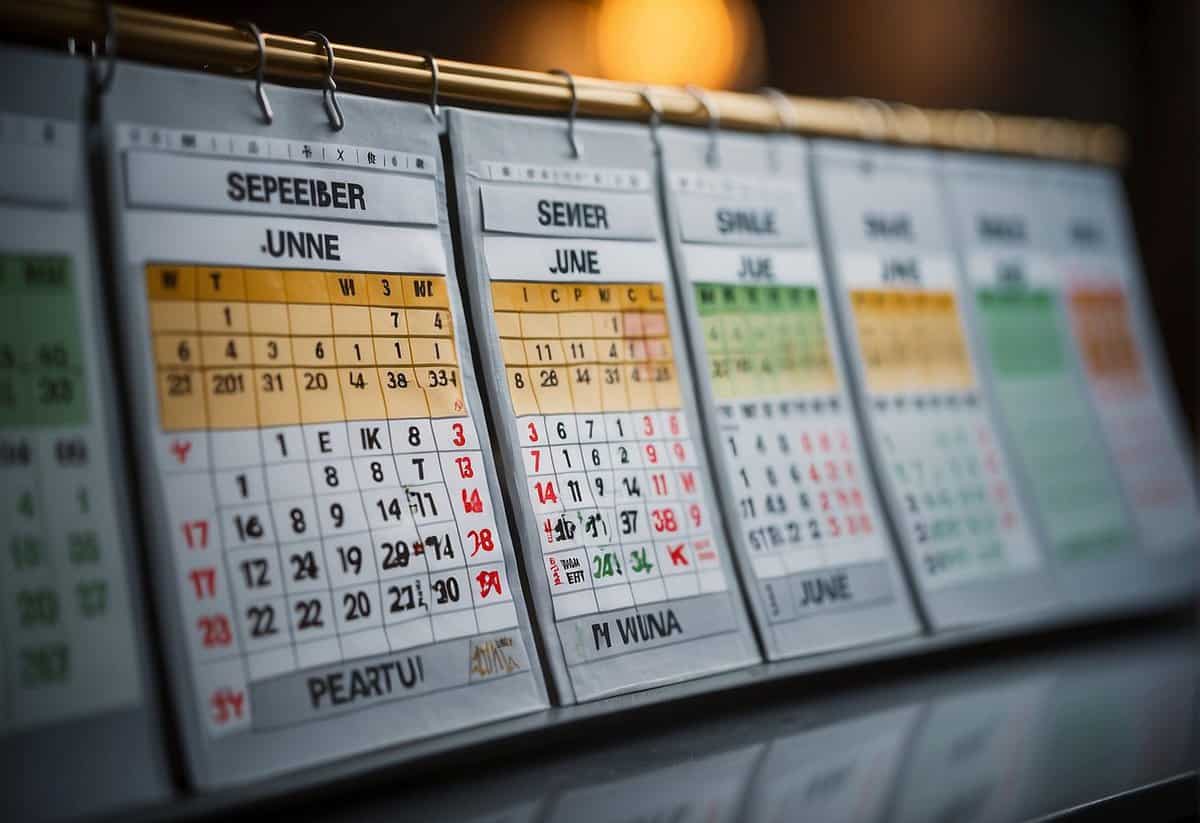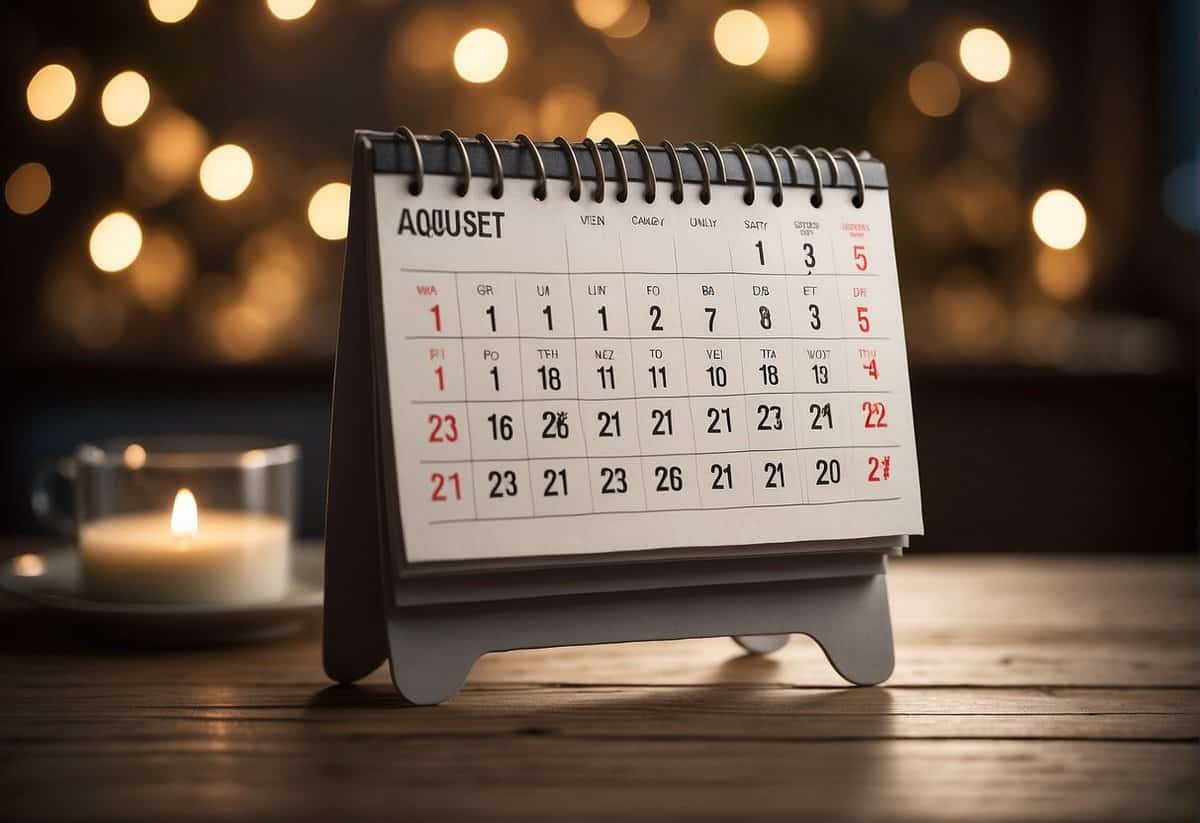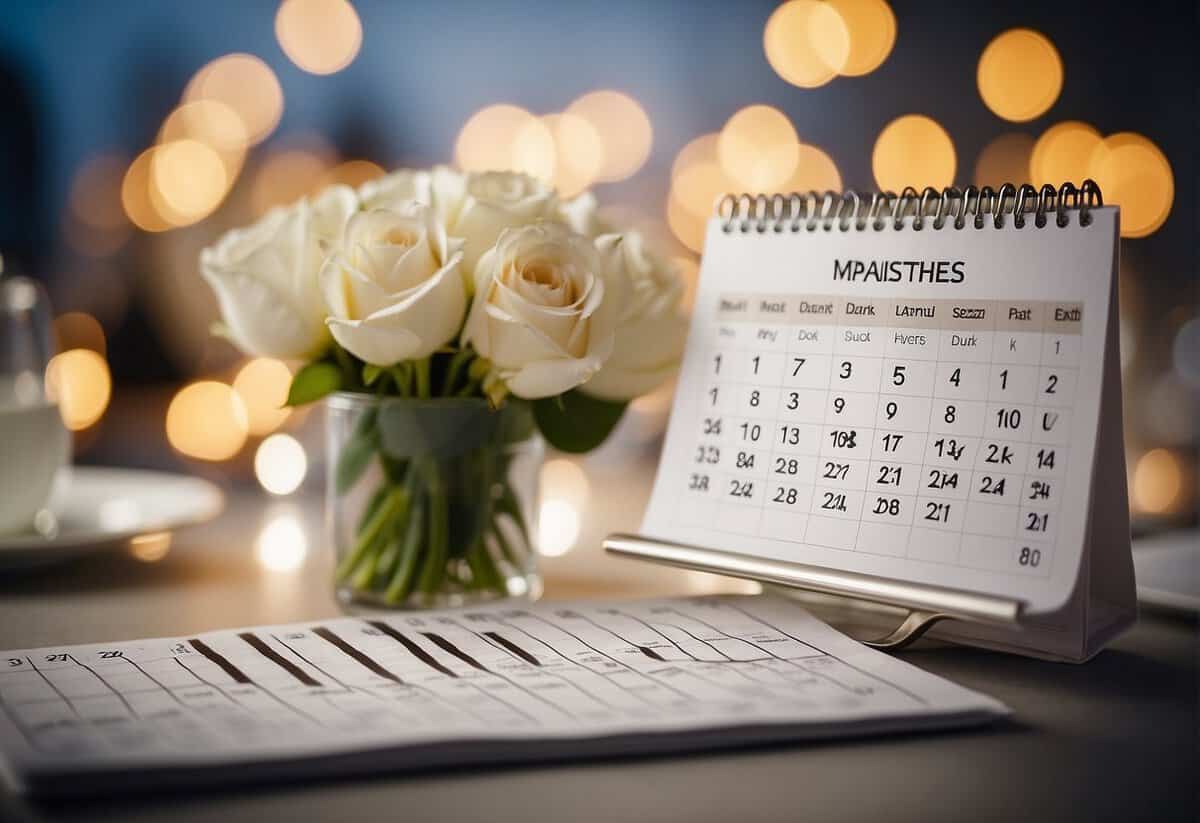What Are the Best Months to Get Married? Choosing Your Ideal Wedding Date
Deciding on the best month to get married is a crucial step in your wedding planning journey. While traditionally, June has been a favored month for weddings, due to its mild weather and the start of summer, recent trends show other months are gaining popularity. Seasons play a significant role, with each offering its unique ambiance and possibilities. The fall months, especially September and October, have witnessed an increase in weddings, reflecting the charm and favorable weather conditions of autumn.

In addition to the seasonal charm, you may also consider special dates and holidays when picking your wedding month. These times can add significance to your wedding but also come with logistical considerations like venue availability and guest convenience. You should weigh the pros and cons of peak wedding season against the off-season, where you might find more flexibility and potentially lower costs. The look and feel of your wedding are also influenced by the month you choose; each season offers different natural backdrops and color palettes for your aesthetic and theme.
Key Takeaways
- Seasons greatly influence the most popular wedding months, with fall becoming increasingly favored.
- Special dates and holidays can make your wedding day more meaningful but require careful planning.
- The choice of month impacts logistics, costs, and the overall aesthetic of the wedding.
Deciding on a Wedding Month

When you’re planning your wedding, choosing the right month is crucial as it affects availability, pricing, and the overall ambiance of your special day.
Traditional Peak Wedding Season
Peak wedding season typically falls within the summer and early fall months, specifically May, June, September, and October. These months are highly sought after for their temperate weather and beautiful scenery, making them some of the most popular wedding months. Because of the high demand, securing vendors and venues during this time requires early planning. Vendor availability can be limited, and you may encounter heightened competition for your desired wedding details.
Advantages of Off-Season Weddings
Opting for an off-season wedding, particularly in January, February, March, November, or December, can offer unique advantages. During these months, you might find more availability with vendors and venues, often at lower prices. Off-season weddings can be especially affordable with the potential for negotiating deals, reducing the overall stress of wedding planning. Plus, a winter wedding can be magical with snow-laden landscapes and cozy settings.
Weather Considerations and Seasonal Beauty
Weather plays a pivotal role in selecting your wedding month. Summer weddings bring warmer weather, which is ideal for outdoor ceremonies, but they can also be hot. Fall weddings showcase colorful leaves and crisp air, offering a different kind of beauty. If you’re considering a fall wedding, the stunning fall foliage can create a memorable backdrop. However, keep in mind that late October and early November may bring cool temperatures. Your choice should align with your vision for the day, whether that’s a summer celebration with lush greenery or a winter wonderland with sparkling snow.
Significant Dates and Holidays

When selecting your wedding date, it’s essential to consider how significant dates and holidays can impact both the availability for your desired venue and the convenience for your wedding guests. Let’s explore how to navigate choosing dates around public holidays and significant personal dates that might coincide with your big day.
Choosing Dates Around Holidays
Holidays can add a sense of festivity to your wedding, but they can also affect guest attendance and venue costs. For example, marrying on Valentine’s Day can be incredibly romantic, yet it might clash with guests’ personal plans or result in higher demand for venues and vendors. Equally, holidays such as Labor Day or Memorial Day can provide long weekends, making it more plausible for guests to travel and attend without taking extra days off.
Pros:
- Typically longer weekends
- Guests might already be planning to take vacations
- Potential for a themed wedding
Cons:
- Increased costs
- Venues and vendors may be booked far in advance
- Guests might have traditional family plans
Important Personal Dates
Your significant personal dates, like the day of your engagement or anniversaries, hold a special meaning and can be ideal choices for your wedding date. These dates may make your wedding day even more memorable and personal. It’s crucial to consider your and your guests’ personal schedules; ensure that your big day doesn’t unintentionally overlap with another important event or commitment.
Personal Significance: Dates like the day you two met, your engagement anniversary, or a day that commemorates a loved one can add a special touch.
Guest Considerations: Keep in mind key family or friend’s anniversaries, birthdays, or other significant events to avoid scheduling conflicts.
By thoughtfully considering both public holidays and your own important dates, you can choose a wedding date that is both practical and meaningful.
Logistics and Planning

When planning your wedding, selecting the right month is crucial as it impacts venue and vendor availability, as well as the travel and accommodation logistics for you and your guests.
Venue and Vendor Selection
Once you’ve settled on a month, it’s time to look at venues and vendors. The availability of your desired venue and vendors can vary greatly depending on the month. For instance, June, September, and October are popular wedding months, increasing demand for locations. You’ll want to book these well in advance to ensure you get your top picks. Start with compiling a wedding to-do list that prioritizes booking the wedding venue and vendors. Avoid common wedding dates to avoid, such as major holidays or local events, when venues might be unavailable or more expensive.
- Booking Tips:
- Research and shortlist venues early.
- Inquire about package deals with vendors.
- Consider mid-week dates for better availability.
Travel and Accommodation
If you’re considering a destination wedding, travel becomes a more significant aspect of your planning. Encourage your wedding guests to enter “vacation mode” by providing them with all the necessary travel information in advance. This includes hotel options, transportation details, and any group discounts you may have arranged. For guests’ convenience, negotiate room blocks and rates with hotels near the venue. Remember, if you choose peak travel seasons, rates may be higher and availability lower, so get these bookings done early. Providing a relaxing experience also means considering the closeness of accommodation to the wedding venue for ease of access.
- Accommodation Tips:
- Secure a block of hotel rooms early.
- Provide guests with a detailed travel and stay guide.
- Look for group discounts or shuttle services.
Aesthetic and Themes

Choosing the right month for your wedding can significantly influence the aesthetic and themes available to you. Each season offers unique opportunities for decor and ambiance that can be reflected in everything from your floral arrangements to the overall mood of your ceremony and reception.
Seasonal Themes and Decor
The season you choose for your wedding will dictate the thematic elements. Summer weddings beam with vibrant colors and offer a wide range of flowers like roses, peonies, and lilies. You can create a cozy vibe for autumn weddings with warm colors and an autumnal menu featuring spiced dishes and cider. Winter weddings call for a magical atmosphere with frosted accents, perhaps pine cones, and seasonal flora like holly or poinsettias. Spring, often ideal for outdoor weddings, can be a celebration of new beginnings, with soft pastel tones and delicate flowers, such as tulips and hyacinths.
Photography and Ambiance
Your wedding photos are treasures that capture the essence of your day. Fall weddings might feature a backdrop of changing leaves for a picturesque setting, while summer weddings allow for stunning, sunlit ceremonies that make those special moments sparkle in photographs. Indoor lighting should complement the season — think fairy lights for winter creating a soft, romantic glow, or candles for fall adding an intimate warmth to an indoor setting. Choosing a wedding month that aligns with the desired backdrop of your wedding photos, whether it’s stunning scenery for an outdoor celebration or the elegant indoors, is paramount.
Frequently Asked Questions

Planning your big day involves deciding on a time of year that aligns with both your dreams and your budget. This FAQ section is dedicated to answering some of the most pressing questions about selecting the optimal month for your wedding.
What’s the most affordable month for a wedding?
The most affordable months to get married tend to be when demand is lower, often in the winter months like January or February. Experts suggest considering various factors for a budget-friendly date to say your vows.
Which month is considered the luckiest to tie the knot?
Historically, and in various cultures, June is often cited as a lucky month to get married. It’s associated with the Roman goddess of marriage, Juno, who represents the welfare of women and married life.
What are the peak wedding seasons?
Peak wedding seasons vary by location, but traditionally, they encapsulate late spring through early fall, with June, September, and October being particularly popular months due to favorable weather conditions.
Do certain months have special meanings when it comes to weddings?
Yes, many months hold special significances for weddings. For example, June is linked to Juno, the goddess of marriage, and suggests a month full of blessings. Every month can carry cultural or personal meanings that might inspire your choice.
What time of the year do most couples exchange vows?
The warmer months, specifically June, September, and October, are the most popular times for couples to exchange vows. The pleasant weather and natural beauty during these months create an ideal backdrop for weddings.
Are there any months that are less auspicious for weddings?
Some cultures consider certain times less favorable for weddings. For example, in some traditions, the month of May is considered inauspicious, although this largely depends on personal beliefs and cultural backgrounds.
